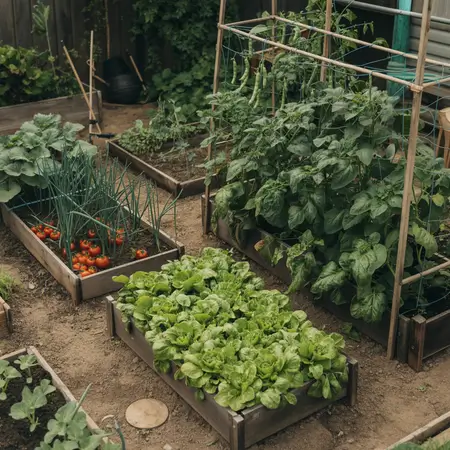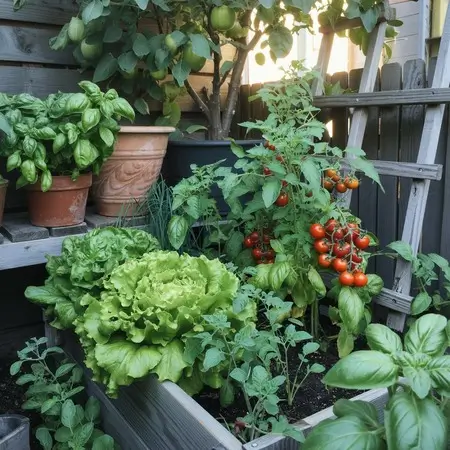Organic Gardening Ideas for Beginners and Old-School Gardeners
Organic gardening is all about keeping things simple, natural, and rewarding. You don’t need chemicals or complicated tools, just a few smart habits and some patience.
Whether you’re a first-timer or a gardener who enjoys old-school methods, these organic gardening tips will help you grow healthy plants while keeping your soil and the planet happy.
1. Start a Compost Pile
Composting is one of the best organic gardening tips because it turns waste into food for your garden. You can save kitchen scraps like fruit peels, vegetable ends, eggshells, and even coffee grounds.

Add dry leaves, grass, or small branches to balance things out. Over time, all of this breaks down into organic compost that feeds your soil.
A small compost bin or even a simple pile in your yard works just fine. It may feel slow at first, but the payoff is big richer soil, stronger plants, and less trash in your garbage can.
2. Use Organic Seeds
Healthy gardens start with healthy seeds. Organic seeds are grown without chemicals, so they’re a natural choice for beginners and old-school gardeners alike.
When you use organic gardening seeds, you’re planting something that’s already strong and ready to grow in a natural way. Look for them at local garden stores or order them online. Many seed packs even share helpful planting tips.
Choosing organic seeds also supports farmers who grow plants the natural way. Starting your garden with organic gardening seeds gives you confidence that your vegetables and herbs are safe and chemical-free from the very beginning.
3. Mix in Organic Fertilizer
Even good soil sometimes needs a little extra help. That’s where organic fertilizer comes in. Unlike chemical options, organic fertilizer feeds your plants slowly and safely, without harming the environment.
You can buy it at most garden stores or make your own from things like composted manure, worm castings, or fish emulsion. These natural boosters help plants grow stronger, give better harvests, and resist pests.
For beginners, this is one of those organic garden tips that makes a huge difference. A little fertilizer at the right time can turn weak plants into thriving ones full of fresh food.
4. Build Raised Beds
Raised beds are a smart way to keep your garden neat and your plants healthy. They’re simply boxes filled with organic potting soil and compost, lifted a bit above the ground.

Raised beds make gardening easier on your back, keep weeds under control, and allow better drainage. If you’re short on space, you can build small ones from wood, bricks, or even recycled materials.
Fill them with rich organic compost and organic potting soil for the best results. Beginners often find raised beds less overwhelming than a big garden plot, and old-schoolers love how tidy and productive they are.
5. Try Companion Planting
Companion planting is an old organic gardening tip that really works. It means putting certain plants together because they help each other grow. For example, basil helps tomatoes taste better, while onions keep pests away from carrots.
This method saves space, reduces the need for sprays, and often gives you a bigger harvest. It’s like building little friendships in your garden. Beginners can start with easy pairs like cucumbers and beans, or lettuce and radishes.
Even if you have a small area, companion planting lets you grow more food in less space while keeping everything natural and chemical-free.
6. Mulch for Moisture
One of the easiest organic garden tips is mulching. Spread organic mulch like straw, shredded leaves, wood chips, or grass clippings around your plants.
This simple step keeps the soil moist, blocks weeds, and keeps roots cool in hot weather. As the mulch breaks down, it turns into organic matter that improves your soil. You don’t need to buy fancy bags either; use what you have at home.
Old-school gardeners love mulching because it saves water and work, while beginners appreciate how it makes plants stronger with less effort. Think of mulch as a blanket that keeps your garden comfortable.
7. Collect Rainwater
Rainwater is one of nature’s gifts to gardeners. Unlike tap water, it’s soft and free of chemicals, which makes it perfect for plants. You can collect it in a barrel, bucket, or even a large container placed under a gutter.
Use this water on your vegetables, herbs, and flowers to help them grow naturally. Collecting rainwater also saves money and makes your garden more sustainable.
This is one of those simple organic gardening tips that feels old-fashioned but works just as well today. Plus, it teaches you to work with nature instead of against it a true organic gardening habit.
8. Rotate Your Crops
Growing the same plant in the same spot year after year can wear out the soil and attract pests. That’s why crop rotation is one of the smartest organic gardening tips to follow.

The idea is simple: move your vegetables around each season. For example, don’t plant tomatoes in the same bed two years in a row switch them with beans or lettuce instead.
Different plants use and give back different nutrients, so rotating keeps the soil balanced. Beginners can keep a simple notebook to track what they planted where. Over time, this small habit leads to healthier soil and stronger harvests.
9. Grow Easy Herbs
Herbs are a wonderful way to start organic gardening because they’re simple, useful, and rewarding. Basil, mint, parsley, and chives grow well in pots filled with organic potting soil or even in small corners of your garden.
They don’t take much care, and you’ll have fresh flavors for cooking anytime. Old-school gardeners enjoy herbs for their traditional uses, while beginners love how quickly they grow.
A small pot of herbs on your windowsill can give you confidence to try bigger crops later. Growing herbs is one of those organic garden tips that fits any space, big or small.
10. Save Seeds for Next Year
Seed saving is a time-honored tradition that connects you to generations of gardeners. Pick the best fruits and vegetables from your harvest, let them fully mature, and then collect the seeds.
Store them in a cool, dry place for next season. Using your own organic seeds saves money, keeps your garden sustainable, and gives you plants that are already adapted to your soil.
Beginners may want to start with easy plants like tomatoes or beans. Old-school gardeners love this practice because it’s natural and practical. Saving seeds makes your garden truly your own and builds a cycle of growth year after year.
11. Use Natural Pest Control
Every gardener deals with pests, but you don’t need harsh sprays to fight them off. Try natural methods instead. Neem oil, garlic spray, or even soapy water can keep bugs away without hurting your plants or soil.
Another idea is planting flowers like marigolds or nasturtiums, which naturally repel pests. These organic garden tips not only protect your vegetables but also keep your garden safe for kids, pets, and pollinators.
Beginners will find natural pest control easy to try, and old-school gardeners know it’s the way people used to do it simple, safe, and effective.
12. Plant What You Eat
One of the most important organic gardening tips is to grow what you actually like to eat. If you enjoy salads, plant lettuce, tomatoes, and cucumbers. Love pasta? Try basil, oregano, and peppers.

When you grow what you eat, you’ll stay motivated to take care of your plants, and your harvest will feel more rewarding. Beginners often get overwhelmed trying to grow too much at once, but focusing on favorites keeps things fun and simple.
Old-school gardeners will agree practical crops always make the most sense. Planting what you eat makes your organic garden both useful and enjoyable.
Final Words
Organic gardening doesn’t need to be hard. With these easy tips like using organic seeds, compost, and mulch you can grow fresh food while caring for the earth. Start small, enjoy the process, and let your garden teach you along the way.
